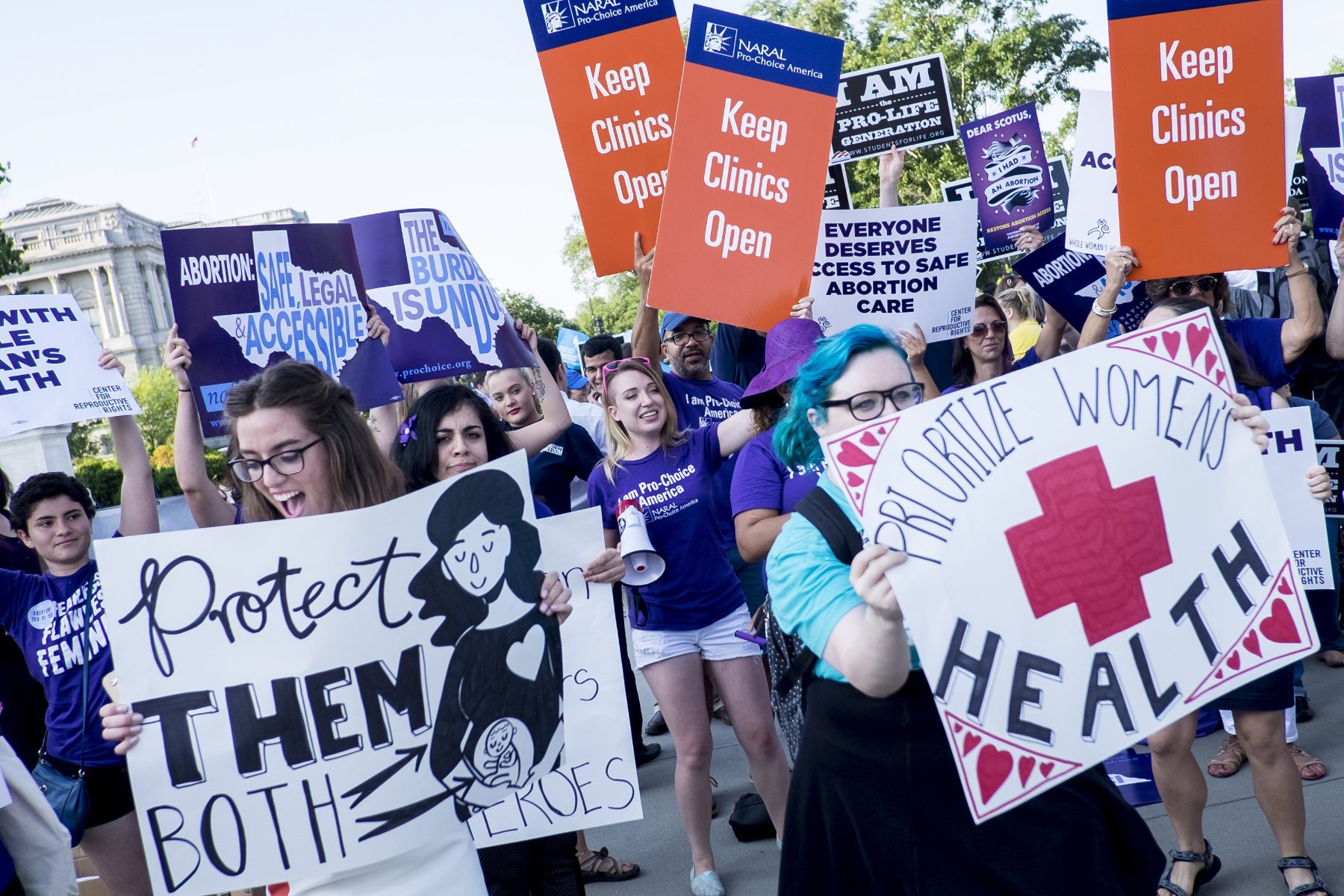Texas’ six-week abortion ban, which cuts off procedure access before many people realize they are pregnant, was reinstated a few hours before midnight on October 8, after the U.S. Court of Appeals for the 5th Circuit granted a temporary emergency stay. The ban had been lifted for 48 hours after a federal judge sided with the Justice Department on October 6.
The case is now on a clear path to be heard by the Supreme Court.
Within the 48-hour window during which the ban was lifted, Whole Woman’s Health told reporters that several people seeking abortion care that had been blocked by SB 8 were able to be seen. Planned Parenthood Gulf Coast provided abortion care to seven patients during the window, CEO Melaney Linton said in a statement.
The law, which originally took effect at midnight on September 1, empowers private citizens to sue anyone they believe may have “aided or abetted” someone getting an abortion after six weeks, which has caused confusion. Under the law, Senate Bill 8, patients themselves cannot be sued for seeking an abortion — but providers and anyone who helps them are fair game.
Here’s what you need to know about Texas’ law, and answers to some questions from our readers.
What happens now that the ban has resumed?
Abortions after six weeks into pregnancy, or after cardiac activity is present, are once again banned in the state. Planned Parenthood Gulf Coast canceled more than half of 23 patients scheduled to be seen on October 9, Linton said in her statement.
In an amicus brief filed by six regional Planned Parenthood groups in Texas, several patients shared how the law has affected them. One, a single mother who cannot get an abortion in the state under SB8, doesn’t know if she will be able to take time off work or get child care for her new pregnancy. Another patient, a retail worker, is struggling to get through the work day and doesn’t know if seeking abortion care out-of-state is an option, The 19th’s Jennifer Gerson reports.
During the 48-hour window in which the ban was lifted, many Whole Woman’s Health physicians and staff were worried about being sued retroactively if they provided abortion care, CEO Amy Hagstrom Miller told reporters that week — demonstrating another potential hurdle as legal fights over the law continue.
How does the law work?
The “aiding and abetting” part of the law lets private citizens sue anyone they believe may have helped someone getting an abortion after six weeks of pregnancy. In a successful lawsuit, the plaintiff would receive at least $10,000 and be reimbursed for legal fees. Within Texas, if someone sues an abortion provider or someone who supported an abortion patient and loses, there are no consequences built into the law for the defendants to recover costs to defend themselves, Marc Hearron, lead attorney for Center for Reproductive Rights, told reporters last month.
The law provides an exemption for broadly defined medical emergencies, but does not include any exemptions for rape or incest. Texas law defines a medical emergency as a “life-threatening physical condition.”
A pregnant person in Texas essentially has a two-week window — the luteal phase of pregnancy, in which early symptoms include food cravings, headaches, bloating and breast tenderness — to seek abortion care.
The pregnancy clock starts by counting back to the beginning of the person’s last menstrual cycle, as The 19th’s Shefali Luthra explained earlier this year. A typical menstrual cycle is 28 days, or four weeks, though many people have irregular periods. Those factors mean someone might not realize they are pregnant until 30 or 40 days, which is just shy of the six-week deadline.
“This is essentially a ban of almost all abortion in Texas except for those who know pretty immediately that they are pregnant — a physician cannot hear a fetal heartbeat or there is a medical emergency,” Rachel Rebouché, a law professor at Temple University and an expert on reproductive rights case law, told The 19th last month.
Jamila Perritt, an OB/GYN and president of Physicians for Reproductive Health, said the law leaves people seeking abortion care “with very few options.”
“Those with resources can try to leave the state to seek care. But this is not an option for most people, who do not have the time, money or support needed to travel out of state for care,” she said.
“Those with fewer financial resources, Black and Latinx women, young people will bear the brunt of this inequity in access,” she continued. “Abortion funds in and outside of Texas have been working around the clock to provide people the support people need to get abortion care.”
What about medication abortion?
Medication abortion, through pills that must be given by a physician, is restricted under Texas’ law since it applies to any abortion after six weeks, reproductive experts and a Planned Parenthood spokesperson said. Emergency contraceptives like Plan B are not affected by the law.
Separate legislation in Texas focused solely on medication abortion has been sent to Republican Gov. Greg Abbott’s desk. The bill would limit patients’ ability to obtain abortion-inducing drugs and ban the pills from being mailed anywhere in the state.
What does this mean for miscarriages?
Technically, since Senate Bill 8 applies only if cardiac activity is present, miscarriage management — which often involves procedures similar to an abortion — would be possible if no cardiac activity is found, a Planned Parenthood spokesperson said.
Rebouché agreed that the bill does not directly address miscarriages but added that the unclear language in the bill could create a chilling effect among physicians and providers.
“It seems to me … any physician who is going to either remove a fetus from a womb, after miscarriage or without miscarriage, is going to have to document that they have tested for a fetal heartbeat,” she said. Providers could still fear civil liability even though the law is clear.
Dilation and evacuation, also known as D&E, is the most common way of performing an abortion in the second trimester — and it was banned in Texas earlier this month. D&E is also one of the most common ways to remove a fetus after a miscarriage but is not bound by that law.
“I wouldn’t say don’t be worried, because the practical reality is it’s very hard to get care in states that go to great lengths to restrict abortion procedures, and abortion access,” she said.
What about other pending legal challenges?
Over a dozen state-court lawsuits challenging the abortion ban have been indefinitely paused by the Texas Multidistrict Litigation panel after the Texas Supreme Court denied an emergency request for the lawsuits — including a challenge from Planned Parenthood — to resume.
Other lawsuits against SB 8 are ongoing, including Whole Woman’s Health v. Jackson and the Justice Department’s case, United States v. State of Texas.
So can anyone report someone for “aiding and abetting” an abortion?
Family, friends, lawyers, members of the clergy, abortion providers and fundraisers could all be implicated in potential lawsuits for helping someone in Texas get an abortion, Perritt pointed out.
Crucially, just because a provider or clinician is following Texas’ new law, that does not insulate them from potential lawsuits, Hagstrom Miller added.
Texas Right to Life, an anti-abortion group, launched a website soon after the law took effect that solicits anonymous reports on how the law may have been violated. The form asks for tipsters to explain how they obtained evidence and what clinic or doctor their evidence relates to.
A Texas Right to Life spokeswoman told NPR last month that no imminent lawsuits are planned against abortion providers. In Travis County, District Judge Amy Clark Meachum barred the organization from encouraging and filing lawsuits against a Dallas nonprofit, per the Texas Tribune.
Reproductive health experts and abortion providers like Planned Parenthood that The 19th spoke with aren’t sure about the specifics of how lawsuits enabled by Senate Bill 8 could play out. For example, whether or not someone who wants to bring a lawsuit against a Texas provider could come under fire for trying to access a patients’ medical records is an open question.
“People are trying to figure out responses without knowing exactly what’s going to happen,” Rebouché said.
What are the legal risks for individuals helping people leave Texas for an abortion?
For anyone who helps someone leave Texas to obtain an abortion or send funds directly, the legal risk is low, Hearron told reporters last month. But, the wide net cast by the law could still lead to trouble, since anyone can file a lawsuit to enforce it.
“You’re not aiding and abetting, because you’re just helping someone access an abortion that is legal outside of Texas,” he said.
Ashley Brink, clinic director at the Trust Women clinic in Wichita, Kansas, said the phones were ringing and ringing on Wednesday as the clinic fielded phone calls. The biggest influx of the calls came from people in Texas, she said.
A separate Trust Women clinic in Oklahoma City has received around 80 appointment requests within the last two days — and roughly two-thirds of those requests were from Texas, communications director Zack Gingrich-Gaylord said. While the organization usually receives a sizable number of calls from Texans, this is a noteworthy increase, he said.
The organization expects Texas’ bill to strain their resources, but they have been preparing for Senate Bill 8 and expanding their resources for the past two months, Brink said.
Gingrich-Gaylord said that Trust Women, which has two clinics based in Oklahoma and Kansas, is not worried about their work being impeded from potential lawsuits that they could face as providers giving abortion services to Texans’ outside the state.
He added that the confusing nature of the bill, which could keep people from knowing what choice to make, is probably the point of the legislation.
“The cruelty is the point,” Brink said.
Can I support people in Texas who want to have an abortion?
Lilith Fund, Jane’s Due Process, and Fund Texas Choice are three local nonprofits — all named in Texas’ providers request for the Supreme Court to block Senate Bill 8 — that fund transportation and provide money for abortions, or free legal counsel and case management.
What questions do you have? Email our team at [email protected].







